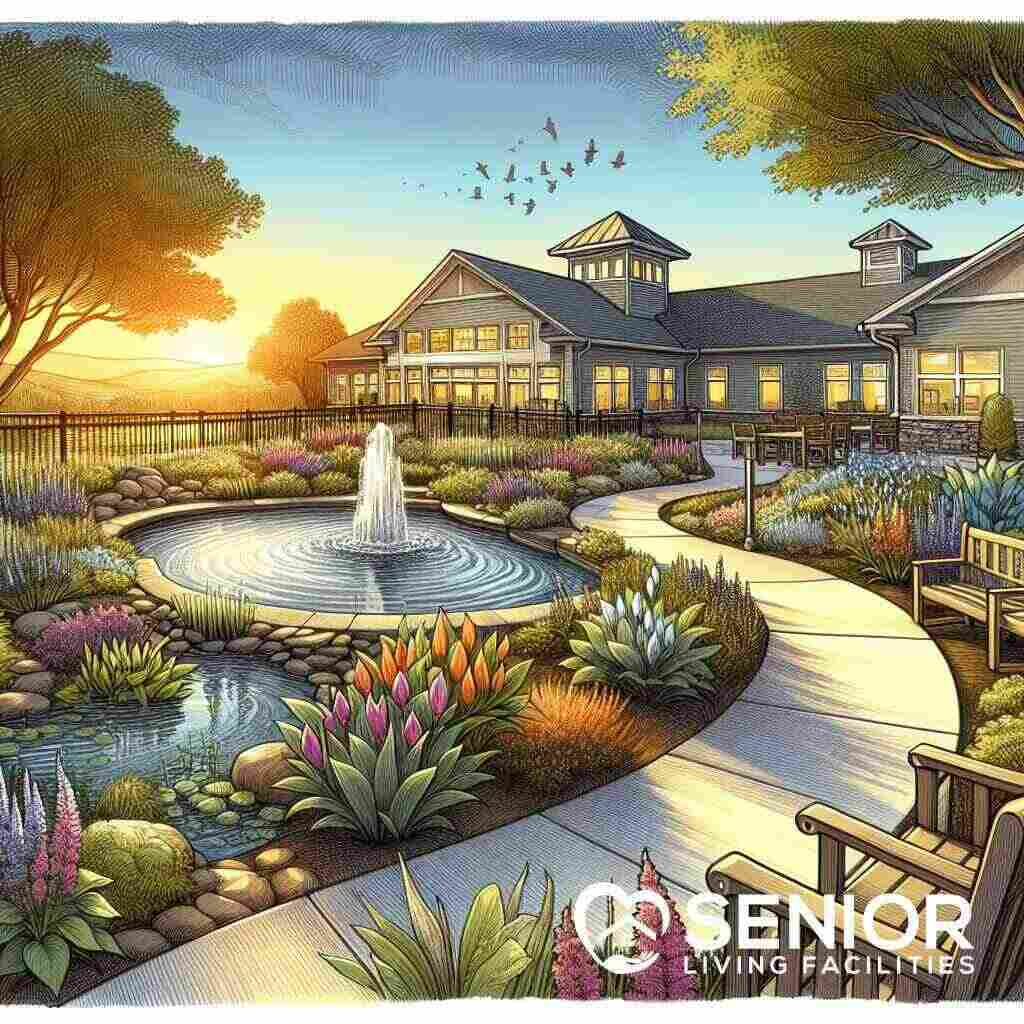
What is Memory Care in North Carolina Explained
June 16, 2024
Understanding Memory Care in North Carolina
Definition of Memory Care
Memory care is a form of long-term care designed specifically for individuals with memory impairments, most commonly seniors suffering from Alzheimer’s disease, dementia, or other kinds of cognitive conditions. Unlike standard senior living solutions, memory care units in North Carolina provide an environment tailored to meet the unique needs of those with memory challenges. These facilities are equipped with staff trained in dementia care, secure environments to prevent wandering, and programs tailored to enhance cognitive function and quality of life.
The Importance of Specialized Care for Dementia and Alzheimer’s
Individuals with Alzheimer’s and dementia require more than just basic care,they need specialized support designed to manage the complexities of their conditions. In North Carolina, memory care facilities offer this specialized care, focusing on safety, personal dignity, and fostering social connections. The importance of such care cannot be understated-it can significantly slow the progression of dementia symptoms, enhance the individual’s quality of life, and provide much-needed respite for family caregivers.
Overview of Memory Care Services in NC
Memory care services in North Carolina encompass a wide range of support and activities designed to maintain or improve the cognitive abilities of residents. Services often include personalized care plans, medication management, daily living assistance, and a variety of therapeutic activities. These may involve music and art therapy, exercise classes specifically designed for seniors with memory impairment, and cognitive activities to enhance mental engagement. Furthermore, the design of memory care facilities emphasizes ease of navigation and safety, with features such as secure outdoor areas to allow residents to enjoy the outdoors without the risk of wandering. For families seeking such services for their loved ones, exploring the memory care in senior living via Senior Living Facilities provides essential insights into available options and considerations.
How Memory Care Facilities Differ From Other Senior Living Options
Comparison with Assisted Living and Nursing Homes
Memory care facilities in North Carolina offer specialized services that distinguish them from other senior living options like assisted living and nursing homes. While assisted living communities provide a degree of personal care and support, memory care facilities deliver personalized care plans aimed specifically at individuals with Alzheimer’s, dementia, and other cognitive impairments. Unlike nursing homes, which offer medical and personal care for residents requiring a higher level of assistance, memory care units emphasize cognitive therapies, secure environments, and activities designed to slow cognitive decline and improve the quality of life. This comparison highlights the importance of selecting the right type of care for loved ones based on their specific needs.
Specialized Staff and Training Requirements
The staff at memory care facilities in North Carolina are not only trained in basic elder care but also receive specialized training in managing and supporting individuals with memory impairments. This ensures they are equipped to handle the unique behaviors, communication challenges, and emotional needs of residents with dementia or Alzheimer’s. Such training often includes strategies on decreasing agitation, enhancing communication, and preventing wandering – a common concern for those with memory issues. These rigorous training requirements guarantee that memory care facilities offer a level of expertise and compassionate care that is not typically available in more general senior housing options.
Security and Safety Features in Memory Erase Units
Safety and security are paramount in memory care units, designed to protect residents who may be prone to wandering or who might become disoriented. Features such as secured entrances and exits, enclosed outdoor areas, and monitoring systems ensure residents’ safety round the clock. Additionally, layouts of memory care units are often more intuitive to help residents navigate the space easily, reducing stress and confusion. The inclusion of safety and security features is a critical aspect that sets memory care apart from other senior living facilities, providing peace of mind for families and a secure environment for residents.
Types of Memory Care Programs in North Carolina
Memory care programs in North Carolina cater to the diverse and evolving needs of residents with Alzheimer’s, dementia, and other cognitive impairments. These programs are meticulously designed to provide holistic support, emphasizing daily living assistance, therapeutic activities, and family engagement.
Daily Living Assistance and Health Management
In North Carolina, memory care facilities prioritize providing comprehensive daily living assistance to ensure the comfort and well-being of their residents. This includes personalized care plans that cater to each resident’s unique needs, from assistance with bathing, dressing, and grooming to medication management and health monitoring. The focus on healthcare provision in senior living facilities ensures that residents receive timely medical attention and health care services tailored to their specific conditions. By fostering an environment of care and support, these programs aim to sustain the independence of seniors for as long as possible while ensuring their health and safety.
Therapeutic Programs and Activities
Central to the memory care approach in North Carolina is the implementation of therapeutic programs and activities designed to stimulate cognitive function and enhance the quality of life. These programs often include art and music therapy, sensory stimulation activities, and physical exercises tailored to the capacities of individuals with memory impairments. By engaging residents in meaningful daily activities supported in memory care units, these facilities aim to slow down the progression of cognitive decline, foster social interactions, and maintain the mental and physical health of residents. The diverse range of activities ensures that all residents can find something enjoyable and stimulating, contributing to a vibrant and positive community atmosphere.
Family Support and Educational Resources
Understanding and navigating the journey of a loved one with dementia or Alzheimer’s is challenging for families. Memory care facilities in North Carolina place a strong emphasis on family support and provide extensive educational resources to assist families through this journey. From offering counseling services to hosting workshops on understanding dementia and Alzheimer’s disease, these facilities strive to create a supportive community for both residents and their families. Regular updates on the resident’s progress, involvement in care planning, and open lines of communication with memory care facilities in NC ensure families are well-informed and engaged in their loved one’s care. This holistic approach to care extends beyond the residents to embrace the families, fostering a sense of trust and reassurance.
Exploring the Best Memory Care Facilities in North Carolina
Criteria for Evaluating Quality Memory Care
Selecting a memory care facility in North Carolina, or anywhere, requires careful consideration of various criteria to ensure the alignment of services with the specific needs of your loved one. Key factors to evaluate include the level of individualized care and attention provided to each resident, the training and expertise of the staff, and the safety and security measures in place. It’s also important to consider the facility’s approach to enhancing quality of life through recreational and therapeutic programs designed specifically for those with memory impairments. Additionally, feedback from current residents and their families can provide invaluable insights into the daily operations and community atmosphere of the facility. Finding a memory care community that not only meets but exceeds these criteria can significantly impact the well-being and happiness of your loved one in their new home.
Top-Rated Memory Care Communities in NC
North Carolina is home to a variety of top-rated memory care facilities that specialize in providing high-quality, compassionate care for individuals with Alzheimer’s and dementia. These communities stand out for their commitment to resident-centered care, innovative therapeutic programs, and state-of-the-art security features. When researching senior living facilities in North Carolina, look for those that have received high ratings from professional healthcare organizations and positive reviews from families. Such recognition is often a reflection of the facility’s dedication to maintaining the highest standards of care, safety, and resident satisfaction.
Personalized Memory Care Solutions
The best memory care facilities in North Carolina understand that each resident has unique needs and preferences. Personalized memory care solutions involve creating custom care plans that address the specific health, nutritional, and social needs of each individual. These plans are developed through consultations with healthcare professionals, the resident, and their family to ensure a holistic approach to care. An emphasis is placed on promoting autonomy and independence, with adjustments made as the resident’s needs evolve over time. Personalized care not only enhances the effectiveness of memory support services but also contributes to the overall sense of dignity and respect experienced by residents.
Choosing a memory care facility for a loved one is a significant decision, and understanding the criteria for evaluating quality care, identifying top-rated communities, and recognizing the importance of personalized care solutions is essential. By prioritizing these aspects, families can find a supportive and nurturing environment for their loved ones, where they will receive the specialized care they need and deserve.
Navigating Memory Care Costs in North Carolina
When families begin the journey of exploring memory care options in North Carolina for their loved ones, understanding the financial aspect is a critical step. The cost of memory care can vary widely based on the location, the array of services provided, and the level of care required by the resident. This section aims to provide a comprehensive overview of the costs associated with memory care, the average expense families might expect in North Carolina, and the available financial assistance and insurance coverage options.
Understanding the Costs Associated with Memory Care
The first step in navigating memory care costs is understanding what these costs entail. Memory care facilities in North Carolina offer specialized services that go beyond the scope of traditional assisted living, from secure environments designed to prevent wandering to programs specifically tailored for residents with Alzheimer’s and other forms of dementia. These services include around-the-clock care, cognitive therapies, physical activities designed to slow the progression of memory loss, and assistance with daily living activities. Given the advanced level of care and supervision required, memory care often incurs higher costs than other types of senior living. Navigating assisted living transitions smoothly can also provide insights into how transitioning from one care level to another impacts costs.
Average Memory Care Costs in NC
In North Carolina, the average cost of memory care can range significantly, depending on the location and the amenities offered by the facility. Generally, families can expect to spend anywhere from $3,000 to over $7,000 per month for memory care facilities. Urban areas such as Charlotte and Raleigh tend to have higher costs due to the higher cost of living and demand for services. It’s critical for families to conduct thorough research and compare facilities in different locations to find a place that fits both the needs of their loved one and their budget.
Financial Assistance and Insurance Coverage
Navigating the financial aspects of memory care can be overwhelming for families, but there are various sources of assistance and insurance coverage options available. Medicare, for example, does not cover the cost of room and board in memory care facilities but may cover certain medical costs incurred while in care. Medicaid, on the other hand, can offer some coverage for individuals who meet eligibility requirements, primarily through Home and Community-Based Services (HCBS) waivers. Additionally, long-term care insurance policies can also cover some aspects of memory care, depending on the terms of the policy. Veterans’ benefits and other state-specific programs may also offer financial assistance options for eligible individuals.
Understanding the financial landscape of memory care in North Carolina involves considering the comprehensive care needs of individuals with memory impairments, the associated costs, and the various avenues for financial aid. By carefully reviewing these factors and exploring all possible resources, families can make informed decisions to secure the best possible care for their loved ones while managing financial implications effectively.
Legal and Health Requirements for Memory Care Facilities in NC
State Regulations and Standards
North Carolina has stringent regulations and standards in place to ensure the safety and well-being of residents in memory care facilities. These regulations are designed to safeguard residents by ensuring facilities meet specific operational, health care, and physical environment standards. Memory care units in NC must obtain proper licensing from the state’s Department of Health and Human Services, which includes compliance with building codes, staff qualifications, and resident care protocols. Regular inspections and compliance checks are conducted to ensure these facilities continuously meet the set standards, providing a safe and supportive environment for those with memory impairments. The regulatory framework also mandates the development of individualized care plans for each resident, ensuring that the care provided meets their specific needs and supports their well-being.
Health and Safety Compliance
The health and safety of residents are paramount in memory care facilities across North Carolina. Compliance with health and safety standards encompasses a range of considerations, from medication management and emergency preparedness to infection control protocols. Facilities are required to implement robust policies and procedures to manage medications safely, reduce the risk of falls, and prevent the spread of infectious diseases. Emergency preparedness plans are essential, detailing responses to potential scenarios such as power outages, natural disasters, and other emergencies. These comprehensive safety measures are crucial in creating a secure environment where residents can live with dignity while receiving the specialized care they require.
Staff-to-Resident Ratio and Qualifications
North Carolina places a significant emphasis on the staff-to-resident ratio and the qualifications of staff working in memory care facilities. Adequate staffing levels are essential to provide personalized and attentive care to each resident. The state mandates specific ratios to ensure that residents receive the attention and support they need, particularly given the complex nature of memory care. Additionally, staff members, from caregivers to medical personnel, must meet rigorous qualification standards, including specialized training in dementia and Alzheimer’s care. This training equips staff with the skills necessary to address the unique challenges faced by residents with memory impairments, such as communication difficulties, behavioral changes, and cognitive support needs. By enforcing these strict staffing requirements, North Carolina aims to elevate the quality of care in memory care facilities, ensuring residents receive expert, compassionate care tailored to their individual needs.
In North Carolina, the approach to memory care is comprehensive, ensuring that legal, health, and staffing requirements converge to create an environment that not only meets the physical and emotional needs of residents but also exceeds their expectations for care and support.
Learn more about finding local senior living facilities near you.
Benefits of Choosing Memory Care in North Carolina
Choosing the right memory care option for a loved one in North Carolina is a decision that comes with many factors to consider. One of the most critical aspects is understanding the benefits that specialized memory care facilities provide. These benefits not only cater to the medical and physical needs of residents but also focus on enhancing their quality of life and dignity, ensuring access to specialized health care, and offering opportunities for community and social engagement.
Enhanced Quality of Life and Dignity
Memory care facilities in North Carolina are designed with the specific needs of individuals with memory impairments in mind. The environment, care plans, and activities are all tailored to support residents in a manner that promotes their dignity and enhances their quality of life. Personalized care plans ensure that each resident receives the attention and support they need, reflective of their interests, abilities, and personal history. Such personalized care helps maintain residents’ identities and a sense of self, which is crucial for individuals experiencing cognitive decline. Furthermore, these facilities are structured to minimize frustration and maximize independence, allowing residents to engage in activities of daily living at their own pace, which significantly contributes to a dignified and fulfilling life.
Access to Specialized Health Care
In North Carolina, memory care facilities are staffed with trained professionals who specialize in caring for those with Alzheimer’s and dementia. This specialized training means that staff members are adept at managing the unique challenges that come with these conditions, such as communication barriers, behavioral changes, and the need for structured routines. Moreover, these facilities have protocols and partnerships in place for specialized health care services, including on-site visits from neurologists, psychiatrists, and other healthcare providers as needed. The availability of specialized health care within these communities ensures that residents receive comprehensive and timely care, tailored to their changing needs as their conditions progress.
Community and Social Engagement Opportunities
Isolation and loneliness can have significant negative impacts on individuals with memory impairments, potentially exacerbating the symptoms of their conditions. Memory care facilities in North Carolina offer a solution to this challenge by fostering a sense of community and providing ample opportunities for social engagement. Through a variety of group activities, such as art classes, music therapy, and social events, residents can connect with others, share experiences, and maintain a social lifestyle. These social engagements are not only enjoyable but also key in supporting cognitive function and emotional well-being. The community atmosphere in these facilities encourages friendships and support networks among residents and staff, creating a warm and welcoming environment that feels like home.
Opting for a memory care facility in North Carolina means selecting a supportive living environment that goes beyond basic care needs. The focus on enhancing quality of life, accessing specialized health care, and thriving in a socially engaging community makes memory care a comprehensive and compassionate choice for individuals with memory impairments. For families looking to find the best memory care options near them, resources such as how to find senior living facilities near you can provide valuable information and support in making informed decisions.
Making the Decision for Memory Care in NC
When Is the Right Time for Memory Care?
Deciding when is the right time for a loved one to move into a memory care facility in North Carolina can be one of the most challenging decisions for families. When these signs become more pronounced, it’s crucial to consider the benefits of a supportive and structured environment designed for the unique needs of those with Alzheimer’s and dementia. Typically, the decision-making process begins when it’s evident that the individual requires more care and specialized attention than what can be safely provided at home. Signs indicating the need for memory care may include frequent wandering, difficulty with daily living activities, progressive memory loss, and behaviors that might pose safety concerns. When these signs become more pronounced, it’s crucial to consider the benefits of a supportive and structured environment designed for the unique needs of those with Alzheimer’s and dementia. Further understanding can also be gained by exploring the definition and examples of senior living facilities, to grasp the range of options available.
Questions to Ask Potential Memory Care Facilities
Selecting the right memory care facility is pivotal for the well-being of your loved one. It involves asking the right questions to ensure the facility meets their needs and your expectations. Key questions include asking about the staff-to-resident ratio, the specific training staff receive in dementia care, the types of activities and therapies provided, how medical emergencies are handled, and the level of family involvement expected. It’s also essential to inquire about the facility’s approach to handling challenging behaviors common in residents with dementia, like aggression or wandering. Understanding what a typical day looks like for residents can provide insights into the daily care and engagement your loved one will receive.
Preparing for the Transition to Memory Care
Transitioning a loved one to memory care in North Carolina requires thoughtful planning and emotional preparation. It’s beneficial to involve the individual in the decision-making process as much as their cognitive condition allows, to help them feel part of the transition. Preparing emotionally involves discussing with family members about the change and what it means for the person moving and for those who care about them. It’s also practical to familiarize oneself, and the loved one if possible, with the new environment before moving day. This can include multiple visits, participating in activities offered by the facility, and meeting staff and other residents. Gathering personal items that carry emotional significance for the person-such as photos, favorite books, or a cherished blanket-can help make the new environment feel more like home. Preparing for this transition early, with ample time for personal and logistical arrangements, can ease the process for both the individual and their family, ensuring a smoother adaptation to their new community.
Connecting with Memory Care Communities in North Carolina
How to Find Memory Care Near You
Finding the right memory care community in North Carolina for a loved one can feel overwhelming, but with the correct approach, the process can be streamlined. Starting with a simple online search can provide a broad overview of memory care facilities in your area. Key search terms like “memory care in North Carolina,” “NC memory care communities,” or “senior living with memory care in NC” can yield a comprehensive list of potential options. It’s beneficial to narrow down these choices based on the specific needs, preferences, and budget of your loved one. Additionally, contacting local senior care advisors and visiting specialized online platforms that focus on senior living accommodations can offer personalized recommendations and invaluable insights into each facility’s offerings.
Using Senior Living Facilities Website for Guidance
The Senior Living Facilities website functions as an exceptional resource for families embarking on the search for a memory care community. By entering specific criteria such as location, type of care needed, and preferred amenities, the platform’s search feature simplifies the daunting task of finding a facility. Senior Living Facilities provides detailed profiles for memory care communities, including descriptions of their services, amenities, photos, and reviews. This level of detail aids in making an initial selection of potential residences that suit your loved one’s unique requirements. Furthermore, the website offers articles and guides on understanding memory care, the costs involved, and how to choose the best option, equipping families with the knowledge to make informed decisions.
The Role of Personalized Tours and Consultations
After narrowing down memory care communities through research and using resources like Senior Living Facilities, the next crucial step is visiting the selected facilities in person. Personalized tours and consultations allow families and their loved ones to experience the environment of the memory care community firsthand, observe the interaction between staff and residents, and assess the overall atmosphere and safety measures. During these visits, it’s essential to ask questions about daily routines, care plans, staff qualifications, and any concerns that might be specific to the individual’s condition. Many facilities also offer trial stays, providing an opportunity for your loved member to experience life in the community before making a final decision. These visits are invaluable in ensuring that the chosen memory care facility not only meets the practical and medical needs but also feels like a welcoming, comfortable home for your loved one.
Conclusion: Embracing Memory Care as a Path to Supportive Clicking
The Future of Memory Care in NC
The landscape of memory care in North Carolina is poised for evolution, with a growing focus on innovative therapies, personalized care, and advanced technologies to enhance the lives of individuals with dementia and Alzheimer’s. As our understanding of these conditions deepens, memory care communities are incorporating new strategies to ensure that they not only cater to the immediate needs of residents but also anticipate future developments in care. Technological advancements, such as the use of AI to monitor health and cognitive patterns, are beginning to complement the human touch, promising a new era of efficacy in memory care. Furthermore, with a societal shift towards more inclusive and comprehensive approaches to dementia care, NC memory care facilities are expected to increasingly emphasize environments that foster a sense of community, individuality, and joy in their residents. As such, the future of memory care in North Carolina is not just about managing symptoms but about enhancing the overall quality of life.
The Benefits of Early Planning and Decision Making
Initiating conversations about memory care early in the diagnosis process and engaging in proactive planning can significantly ease the transition for both the individual and their family. Early planning allows for more time to research options, understand the financial implications, and make thoughtful decisions regarding care preferences. It also provides an opportunity for the individual with memory impairments to express their wishes and be involved in the planning process, which can be critical for their sense of autonomy and dignity. Deciding on memory care facilities prior to a crisis ensures that families are not forced to make hasty decisions under stressful circumstances, allowing them to choose a community that best matches their loved one’s needs and preferences. This foresight not only secures a smoother transition but also optimal care that aligns with the individual’s values and life history.
Creating a Supportive Environment for Loved Ones
Creating a supportive environment for loved ones transitioning to memory care involves more than selecting the right facility,it’s about continuously engaging with them in ways that affirm their worth and identity. Families play an integral role in this by maintaining regular visits, customizing their living spaces with personal belongings, and advocating for their care needs. Interaction with familiar faces and objects can create a bridge between past and present, helping to anchor residents in a sense of self and continuity. Moreover, encouraging participation in community activities can foster new connections and a sense of belonging. By nurturing these emotional ties and facilitating involvement in the memory care community, families can help their loved ones adjust to and thrive in their new living environment. The goal is to cultivate a milieu that not only addresses the pragmatic aspects of care but also nourishes the spirit, ensuring that residents feel valued, understood, and above all, loved.
Transitioning a loved one to memory care is a journey marked by empathy, understanding, and thoughtful consideration. By exploring the future of memory care, recognizing the benefits of early planning, and fostering a supportive environment, families can navigate this path with confidence and peace. Embracing memory care as a positive step toward supportive living allows individuals with dementia and Alzheimer’s to continue leading lives marked by dignity, joy, and meaningful engagement.
Frequently Asked Questions
Question: Can Senior Living Facilities help me find Alzheimer’s care facilities in North Carolina tailored to my loved one’s specific needs?
Answer: Absolutely. At Senior Living Facilities, we pride ourselves on providing a comprehensive database of Alzheimer’s care facilities in North Carolina that cater to the varying needs of individuals. By entering your location on our platform, you can access detailed information on specialized memory care in NC, including services focused on Alzheimer’s and dementia care. Our goal is to simplify the process of finding a high-quality memory care facility that aligns with your loved one’s unique needs, ensuring they receive the specialized care and support they deserve.
Question: What makes North Carolina an ideal location for selecting a memory care facility for my family member?
Answer: North Carolina offers an exceptional variety of memory care facilities that are tailored to meet the diverse needs of individuals with memory impairments. From the serene landscapes to the mild climate, NC provides a comforting backdrop for memory support services. Additionally, memory care in North Carolina is known for its comprehensive array of services, including personalized care plans, secure environments, and recreational activities designed to promote cognitive health. With Senior Living Facilities, finding a supportive memory care community in North Carolina is just a click away, ensuring your loved one benefits from the best memory care options available.
Question: How does Senior Living Facilities ensure the quality of the memory care listings provided for North Carolina residents?
Answer: Senior Living Facilities meticulously vets each memory care facility listed on our platform to ensure the highest quality of care. This process includes verifying licenses, reviewing health and safety records, and even checking the qualifications and training of the staff in these facilities. Our focus on accurate and up-to-date information means families can trust the listings provided when searching for “senior living with memory care in NC” or “North Carolina memory care facilities” on our site. We aim to empower families with reliable data to make informed decisions about dementia and Alzheimer’s care facilities in North Carolina.
Question: In reading ‘What is Memory Care in North Carolina Explained’, how can Senior Living Facilities assist in navigating the costs of memory care in NC?
Answer: Senior Living Facilities understands that navigating memory care costs in North Carolina can be a complex process. Our platform provides families with tools to compare memory care facilities, including transparent information on the costs associated with each. We also offer insights into financial assistance options, such as Medicaid, veterans’ benefits, and other programs that might help offset the costs of memory care living options in North Carolina. Our platform provides families with tools to compare memory care facilities, including transparent information on the costs associated with each. We also offer insights into financial assistance options, such as Medicaid, veterans’ benefits, and other programs that might help offset the costs of memory care living options in North Carolina. By utilizing our resources, families can effectively plan and manage the financial implications of securing high-quality memory care for their loved ones. Discover more at Ultimate Guide to Affordable Senior Living in 2024. Discover more at Ultimate Guide to Affordable Senior Living in 2024.
Question: How can I ensure the memory care facility in North Carolina chosen for my loved one allows for personal and social engagement, as emphasized by Senior Living Facilities?
Answer: When you search through Senior Living Facilities for memory care communities, you’ll find that we highlight aspects such as personal and social engagement opportunities available in each listed facility. To ensure these align with your expectations, we recommend inquiring about the daily activities, community events, and therapeutic programs during your personalized tours and consultations. These nuances, such as art and music therapy, group excursions, and social gatherings, are crucial for maintaining a high quality of life. These nuances, such as art and music therapy, group excursions, and social gatherings, are crucial for maintaining a high quality of life. At Senior Living Residential, we believe in the importance of choosing a memory care facility that actively promotes not only the safety and care of its residents but also a vibrant, socially engaging lifestyle.




